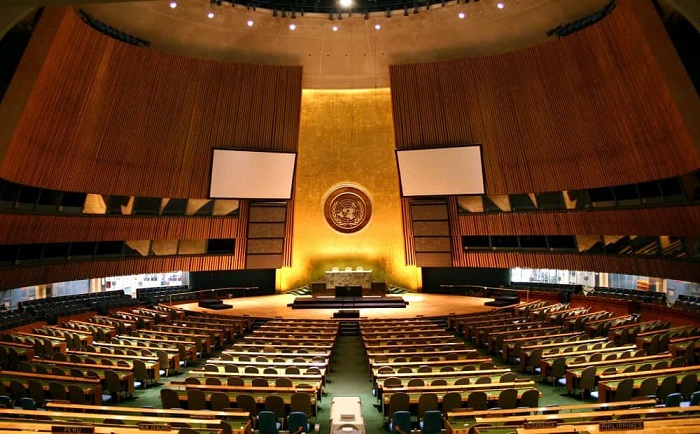

Ebrahim Raisi, infamous in Iran for mass executions and killings, took the stage at the United Nations, criticizing the organization for allegedly failing its primary mission: to safeguard the rights of nations.
While Raisi’s disjointed discourse might have bewildered some international spectators, those well-acquainted with Iranian politics saw a regime struggling to assert dominance over a restive society.
“Raisi’s speech lacked a clear and constructive message for the international audience,” commented an observer. Raisi made audacious claims, presenting Iran as the universal protector of Islam, the Quran, Asian and African nations, and even “the sacred institution of the family.” He audaciously suggested Western countries were nearing collapse and proclaimed that his regime symbolizes the future.
Discussing topics such as Afghanistan, the Ukraine conflict, and the 2015 Iran nuclear deal, Raisi further revealed the regime’s lack of substance. “Apart from deceit and schemes, the regime had nothing substantial to offer,” noted another expert on the matter.
Ebrahim Raisi, a vital member of the “Death committee” in the 1988 massacre of 30,000 political prisoners in #Iran, is scheduled to speak at the #UNGA on September 19. It's crucial to hold him accountable. @CFR_org#ProsecuteRaisiNOW pic.twitter.com/P3og0YdvhP
— NCRI-FAC (@iran_policy) September 18, 2023
Perhaps most tellingly, Raisi spent six minutes discussing terrorism, chastising European nations for not suppressing the People’s Mojahedin of Iran (PMOI/MEK) as Iran desired. “He inadvertently shed light on the paramount threat his regime is facing,” said a political analyst.
Over the last quarter, two prominent IRGC-affiliated news agencies have published over 12,000 pieces of fake news aimed at tarnishing the MEK’s image. This intense propaganda effort for Persian speakers worldwide underscores the regime’s profound insecurity.
“His intention was to demonstrate to the regime’s officials and guardians that we absolutely do not yield to international demands and will project power to all,” remarked a historian familiar with the regime’s patterns.
This agenda was evident in the behavior of the Iranian delegation in New York. Members attempted to intimidate Iranian dissidents and Persian-language media activists. The delegation’s orchestrated actions seemingly aimed to assert the regime’s control to Iranians everywhere.

Khamenei’s targeted audience, the paramilitary and intelligence loyalists, might view his claim of “the decline of the liberal democracy system” as evidence of their strength. Yet, the reality is the Iranian people increasingly understand the need to address this aggressive regime equitably.
Raisi’s attempts to convey stability and power, especially when he insisted his administration isn’t on the verge of being overthrown, might have inadvertently unveiled his regime’s deepest fears. As world leaders left the assembly, the consensus was clear: behind Raisi’s bravado lies a regime grappling with looming challenges, both from within and outside its borders.

MEK Iran (follow us on Twitter and Facebook), Maryam Rajavi’s on her site, Twitter & Facebook, NCRI (Twitter & Facebook), and People’s Mojahedin Organization of Iran – MEK IRAN – YouTu







